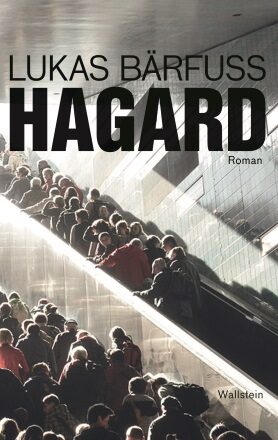Lukas Bärfuss
Hagard
[Hagard]
Lukas Bärfuss
Hagard
[Hagard]
Sample translations
Hunting scenes from the metropolis
The French word "haggard" can be translated as "wild, shy, disturbed". In the lexicon of hunting, it refers to captive animals, especially birds of prey, which can be trained, yet are never fully tamable. Philip, the protagonist of the novel, is a real estate manager in his late forties, who is trapped in an average everyday life—the pressure to increase efficiency and concomitant sense of emptiness in his own life. While waiting for an insolvent business partner on a March afternoon in Zurich's pedestrian zone, he experiences a strange break in his life, which possibly begins as a whim, but grows into a full-fledged obsession As if under a mysterious spell, he spontaneously begins to follow a young woman, who has just stepped out of a department store wearing a pair of plum blue ballerina flats. She nimbly winds her way through the city, and though Philip is unable to see her face, he is fascinated and irresistibly drawn to her. He frequently loses track of her but manages to stay on her trail.
The chase, which turns the hitherto inconspicuous, well-earning father (he has a son) into a wild stalker, leads the hunter into the desolate periphery of the metropolis and into increasingly bizarre and macabre situations. It also becomes a race against time as the battery of his cell phone is low and he depends on it entirely as a bridge to his middle class existence.
Bärfuss stages the breathless, tragicomic odyssey not only as a parcours of a personal obsession, but also as a panorama of a prosperous modern world with its hostile precincts and latent threats. The plot is insouciantly dated to the exact two days of March 2014, in which the Boeing 777 of Malaysia Airlines had disappeared, the occupation of the Crimea, and Asian avian flu, all of which had dominated the media at the time. The topography of Zurich also can be traced to the real city, even though it is never mentioned by name. The author's art consists in creating a completely surrealistic ambience from this realistic time and space constellation, in which digital machines inevitably will lead to "the abolition of humankind," through an easily accepted external control.
Against this background is the stalker’s intoxicating crazy love, whose fantasies have turned the object of his hunt into a being made of light, even a "goddess," which ultimately turns out to be a final desperate escape from his dystopic present. Even though the frame story, consisting of a retrospective look back at Philips' biography, as well as the somewhat enigmatic catastrophic conclusion, is not as convincingly portrayed as the oppressive, satirically exaggerated sequence at the center of the novel, "Hagard" is nonetheless one of the most important and exciting German-language prose works in recent times.
Translated by Zaia Alexander

By Kristina Maidt-Zinke
Kristina Maidt-Zinke is a book and music critic at the Süddeutsche Zeitung and also writes reviews for Die Zeit.
Publisher's Summary
In each one of his novels, Lukas Bärfuss ventures into completely new territory. In »Hagard« he follows a follower; the reader almost feels as though he is inside his head.
A man has been standing at the entrance of a department store in the closing-time rush when suddenly, on a whim, he begins following a woman. He does not know her, and only sees her from behind. But as though he were looking into a mirror, he says to himself: if she goes that way I will stop following her, but if she goes in the other direction I will continue to play the game for a little longer. It means nothing, noone is going to come to any harm, and the distance between us in the crowd is so large that the woman will not even notice. It is more of a sporting challenge not to get lost in the crowd.
Philip has an appointment in just under an hour anyway. But he is already wondering whether he might be able to postpone it – this would give him a little more time before his evening appointment. At first his motivation is unclear. Is the follower simply a bored city slicker? A madman? A criminal? He seems to be running away from something himself.
There is something threatening in the air, something driven. As the pursuit continues, the reader is increasingly drawn into a breathtaking maelstrom of events.
All sensory perceptions are shrouded in an atmosphere of surreal foreboding. The questions that arise on the reality of life in the 21st century take on an inescapable urgency.
(Text: )
